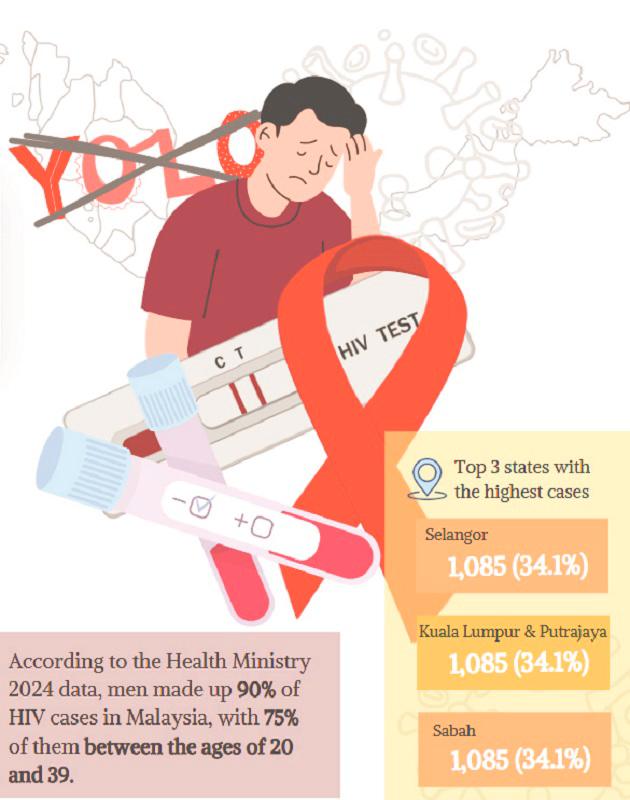PETALING JAYA: A worrying trend is emerging among young Malaysian men – risky behaviours that are fuelling a rise in HIV cases.
According to the Health Ministry’s 2024 surveillance data from the National AIDS Registry, men made up a staggering 90% of HIV cases, with 75% in the 20-39 age group.
Selangor tops the list with 1,085 new cases (34.1%), followed by Kuala Lumpur and Putrajaya with 365 (11.4%) and Sabah with 344 (10.8%).
Some quarters attribute the surge to a “Yolo” (You Only Live Once) mindset, linking it to risky sexual behaviour. But experts
say there’s more beneath the surface.
Universiti Kebangsaan Malaysia anthropology and sociology senior lecturer Dr Velan Kunjuraman believes the issue is deeply rooted in societal views of masculinity.
“The Yolo mentality isn’t just about living for the moment.
“It’s shaped by peer influence, masculine ideals and gendered socialisation.
“Traditional gender norms depict men as dominant, fearless and impulsive, pushing them towards behaviours like unprotected sex or multiple partners.”
In Malaysia, these norms reinforce the notion that risk-taking is a marker of manhood.
Velan pointed to the concept of hegemonic masculinity – the culturally dominant ideal of manliness – which pressures men to prove themselves through bold actions.
“Peer validation is critical,” he said, adding that many young men feel compelled to engage in casual sex or avoid conversations about sexual health just to fit in.
Another key driver is the stigma surrounding sexual health.
“Many fear judgement if they speak up, which leads to misinformation and dangerous choices.”
He highlighted glaring gaps in Malaysia’s sex education system.
He added that cultural and religious taboos continue to stifle open discussions, leaving young Malaysians without the tools to make informed decisions.
“Unlike Western countries where sex education is institutionalised, here, young people often rely on hospitals or specialised centres for basic information.”
Compounding the issue is the role of dating apps and social media.
Their anonymity and accessibility encourage casual encounters, often without safe sex practices.
Velan cited Pakistan, where similar digital trends had triggered spikes in HIV cases.
But it’s not just about sex. Broader social pressures – economic stress, job insecurity and isolation – are also fuelling risky behaviours.
“When life feels uncertain, some turn to these behaviours for temporary relief.
“It becomes a coping mechanism, but one that carries serious risks.”









